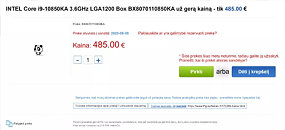Friday, July 24th 2020

Intel 10th Gen Core i9 KA Series Listed, More Comet Lake-S CPUs Incoming?
This one is sort of a brain-scratcher. Storefronts have started listing Core i9 KA versions of Intel's 10th Gen processors based on Comet Lake-S. The A part of the suffix is one we've never seen Intel use before - the K denotes an unlocked multiplier, which allows for chip overclocking, and Intel's F chips denote ones without integrated graphics built into the silicon. however, KA is a new one. It's being postulated online that these could be CPUs that don't achieve Intel's Boost clocks - but are capable enough of running at the stipulated base clocks for their K-only cousin.
These have been listed on Lithuanian shops, and pricing seems to be mostly in-line with that of Intel's F CPUs. The listed CPUs are the Core i9-10900KA (part number BX8070110900KA), with a 3.7 GHz Base clock, for €525; the Core i9-10850KA (BX8070110850KA) with a 3.6 GHz base clock, for €485; the Core i9-10700KA (BX8070110700KA) with a 3.8 GHz base clock, for €408; and the Core i9-10600KA (X8070110600KA) with a 4.1 GHz base clock, for €278. All CPUs also seem to have the same L3 cache size. That Core i9 naming scheme on the 10700KA and 10600KA though... Seems very, very strange.Price comparison within the site shows that these are priced right alongside their i9 F and i7 F counterparts, give or take 2%, so... Maybe Intel is further cherry-picking chips so as to further saturate the market with their offerings whilst grabbing as much money as they can from each one? The Lithuanian retailer that's the source of the leak says in-house samples of these CPUs for sale will be available come August 9th.
Sources:
via Tom's Hardware, momomo_us @ Twitter
These have been listed on Lithuanian shops, and pricing seems to be mostly in-line with that of Intel's F CPUs. The listed CPUs are the Core i9-10900KA (part number BX8070110900KA), with a 3.7 GHz Base clock, for €525; the Core i9-10850KA (BX8070110850KA) with a 3.6 GHz base clock, for €485; the Core i9-10700KA (BX8070110700KA) with a 3.8 GHz base clock, for €408; and the Core i9-10600KA (X8070110600KA) with a 4.1 GHz base clock, for €278. All CPUs also seem to have the same L3 cache size. That Core i9 naming scheme on the 10700KA and 10600KA though... Seems very, very strange.Price comparison within the site shows that these are priced right alongside their i9 F and i7 F counterparts, give or take 2%, so... Maybe Intel is further cherry-picking chips so as to further saturate the market with their offerings whilst grabbing as much money as they can from each one? The Lithuanian retailer that's the source of the leak says in-house samples of these CPUs for sale will be available come August 9th.




28 Comments on Intel 10th Gen Core i9 KA Series Listed, More Comet Lake-S CPUs Incoming?
I see this - "Starting Athlon XP family, all AMD processors were marked with rated speed. Please see AMD Athlon XP identification page for relationship between rated speed and actual speed of AMD Athlon XP microprocessors."
But I don't see what the rating is based on (even when I click), just that there is a rating instead of actual speed which we already know.
1600 MHz (rated), 1400 MHz (real)
266 MHz bus speed
Staggered organic PGA (Socket A/Socket 462)
All Athlon XP microprocessors had rated speed. According to AMD, the rated speed could be used to estimate processor's performance relative to Athlon Thunderbird processors. When compared to Pentium 4 Williamette processors, the XP's rated speed was about 200 - 300 MHz lower than the speed of equally performing Pentium 4. For example, this AMD Athlon XP 1600+ was comparable to Pentium 4 1.8 or 1.9 GHz processors, and it was not uncommon for the XP 1600+ to outperform Pentium 4 Williamette 2 GHz in some benchmarks.
However, the next sentence.............
"When compared to Pentium 4 Williamette processors, the XP's rated speed was about 200 - 300 MHz lower than the speed of equally performing Pentium 4. For example, this AMD Athlon XP 1600+ was comparable to Pentium 4 1.8 or 1.9 GHz processors, and it was not uncommon for the XP 1600+ to outperform Pentium 4 Williamette 2 GHz in some benchmarks."
Though you are correct (thanks!) I feel that a more common use for many users is to compare it against the Pentiums, lol. Akin to saying Kleenex vs tissues. :p
EDIT: In a post that never made it to light, I was going to mention how people even had a clue on performance if it was based on thunderbird athlons compared to Intel... that's a curious naming scheme IMO.
EDIT2: This is a good read - techreport.com/review/2975/amds-athlon-xp-1800-processor/